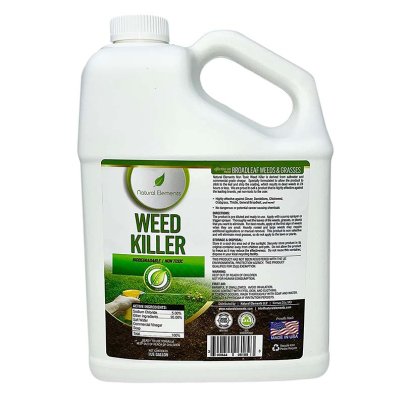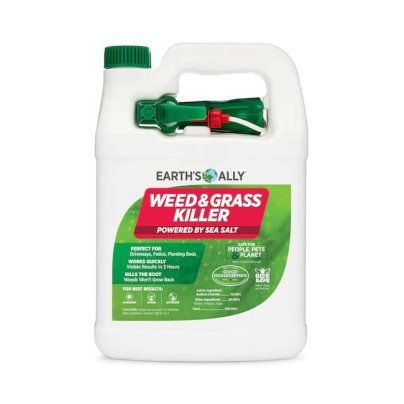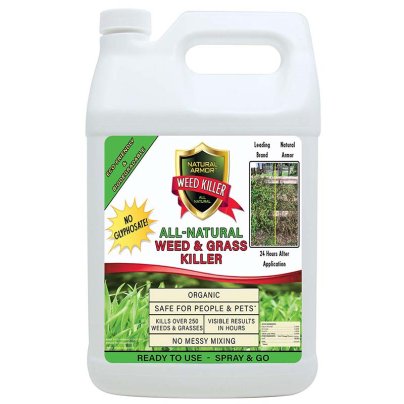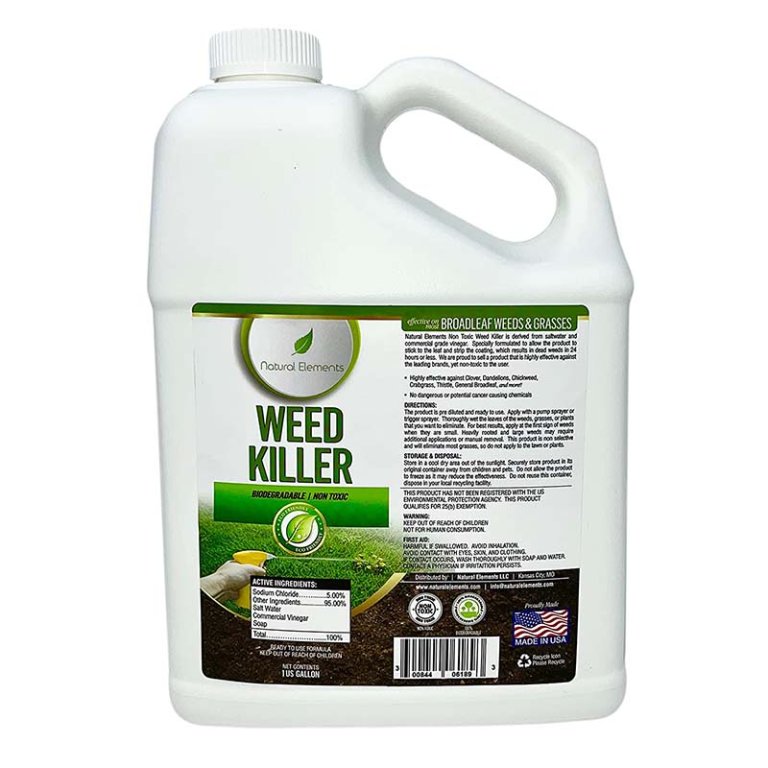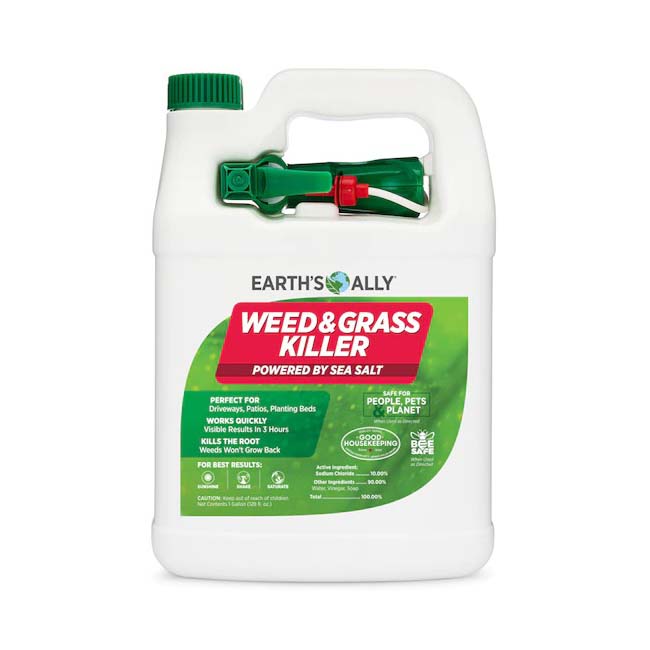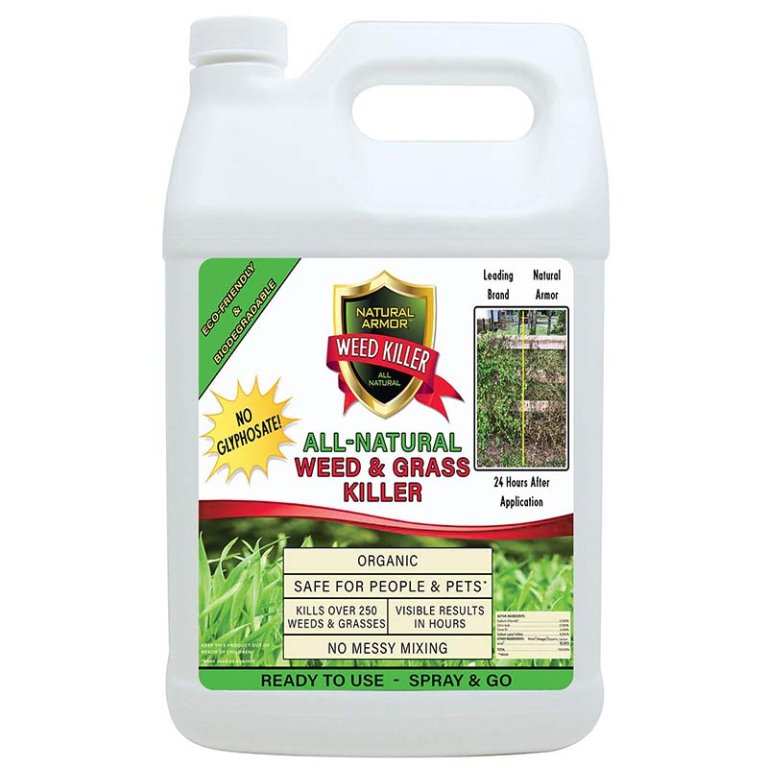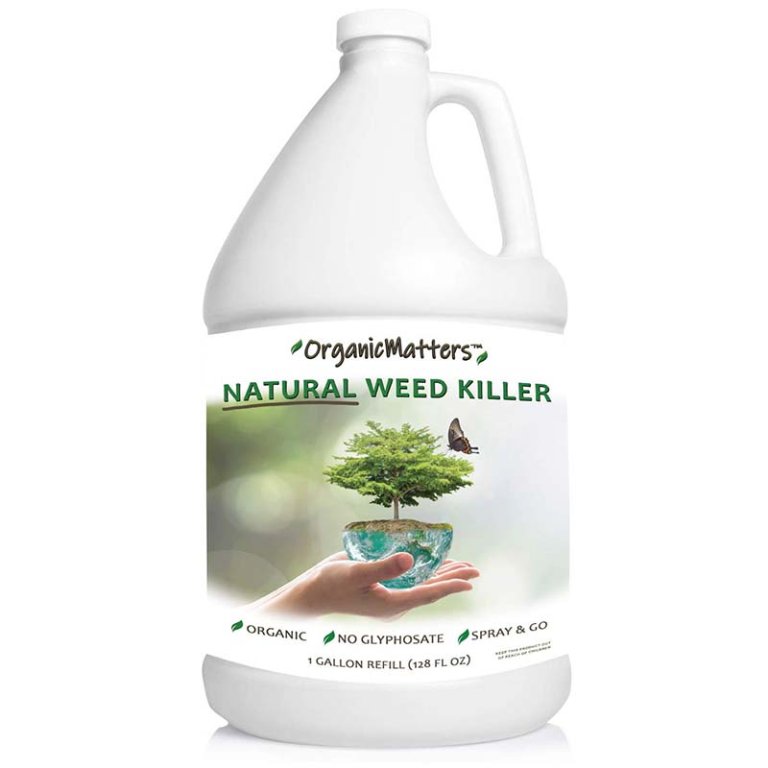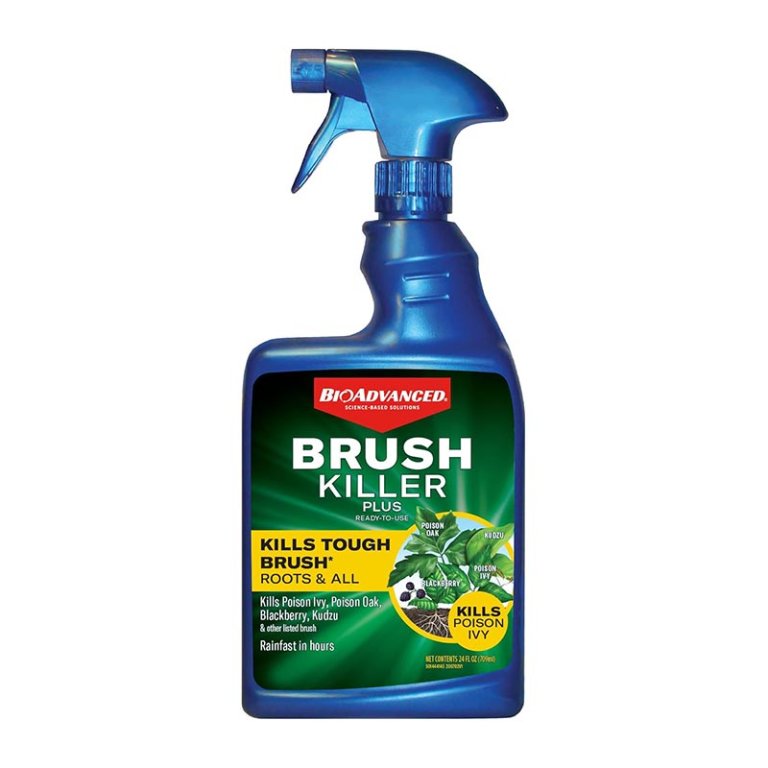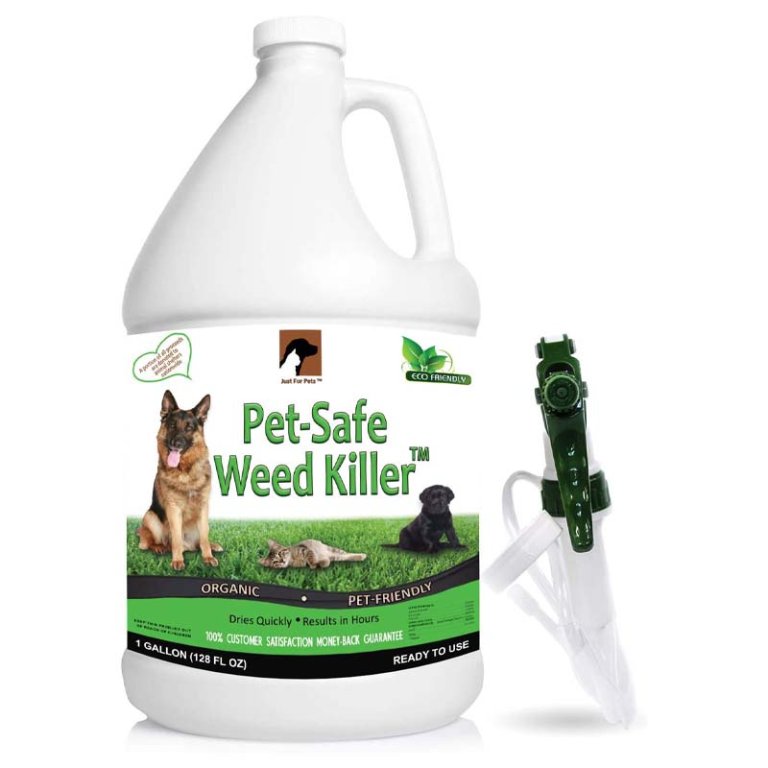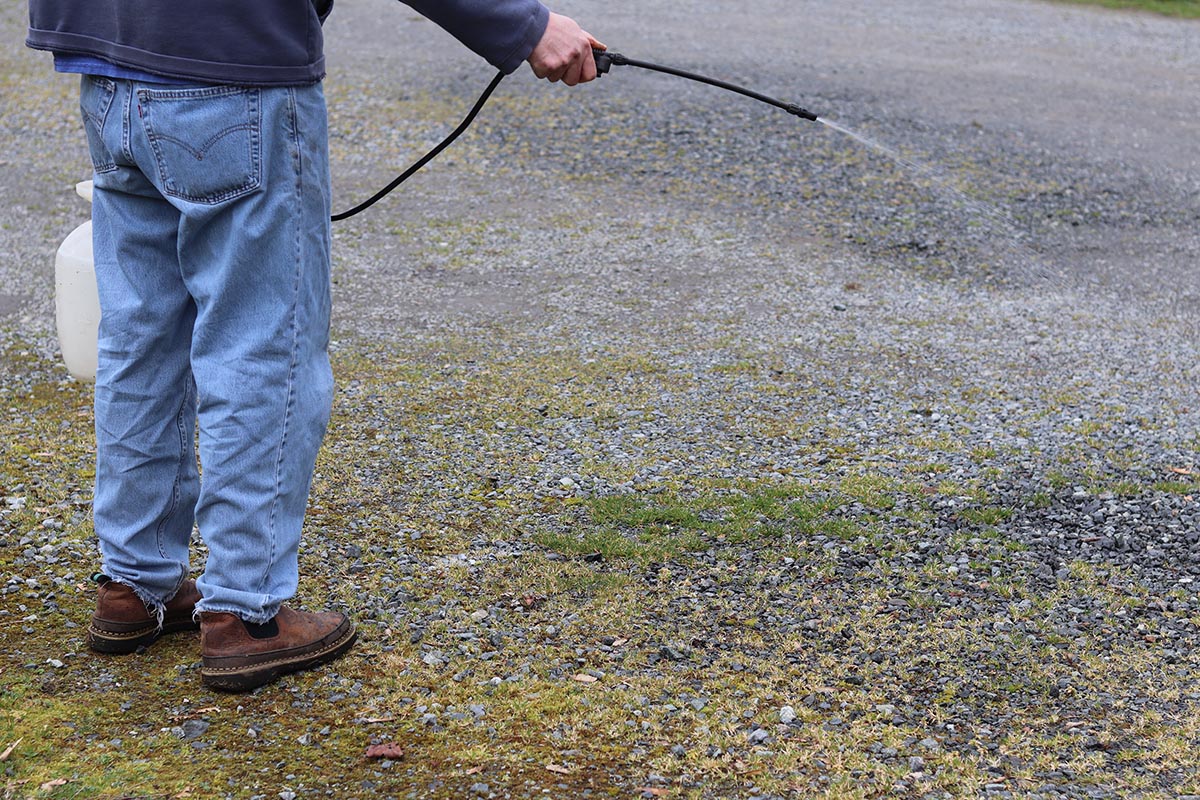
We may earn revenue from the products available on this page and participate in affiliate programs. Learn More ›
Brush killers are essential for managing invasive brushwood species, which can quickly spread along your fence line or create dense, impassable thickets in your yard. Brush—a combination of saplings, conifers, young trees, and invasive vines—thrives in little-used parts of the property, and trying to dig it out is a labor-intensive task. Whether synthetic or organic, a brush killer herbicide provides the power necessary to eliminate invasive brushwood species without excessive effort.
Selecting the best brush killer on the market for your lawn care needs depends on the type of brush you’re dealing with, the extent of the problem, and your preferred method of application. After reaching out to industry experts for their opinion, we selected the Natural Elements Non-Toxic Weed Killer as the top product for meeting most users’ needs. This ready-to-use formula contains all-natural ingredients, is easy to apply, and starts to deliver noticeable results in as little as 24 hours. Ahead, discover the rest of the products we recommend and learn why we consider each among the best brush killers available.
- BEST OVERALL: Natural Elements Non-Toxic Weed Killer
↓ Jump to Review - BEST BANG FOR THE BUCK: Earth’s Ally Ready-To-Use Weed & Grass Killer
↓ Jump to Review - MOST VERSATILE: Natural Armor All-Natural Weed & Grass Killer
↓ Jump to Review - BEST SPRAY BOTTLE: Green Gobbler 20% Vinegar Weed & Grass Killer
↓ Jump to Review - BEST HEAVY-DUTY: OrganicMatters Natural Weed Killer
↓ Jump to Review - BEST FOR DENSE BRUSH: BioAdvanced Ready-to-Use Brush Killer Plus
↓ Jump to Review - ALSO CONSIDER: Just for Pets Pet-Safe Weed Killer
↓ Jump to Review
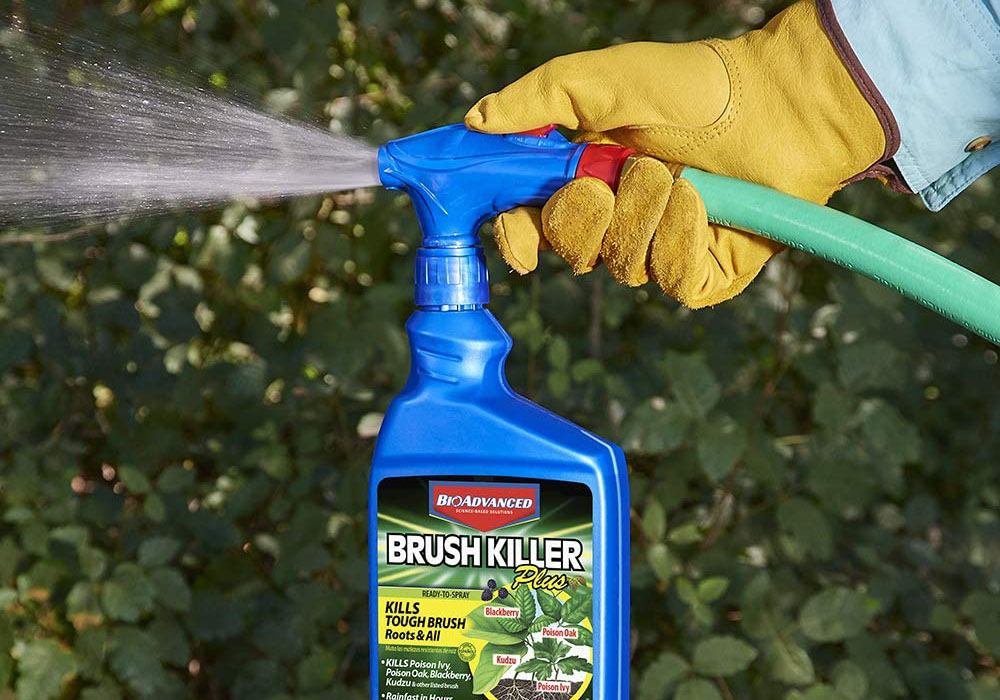
Before You Buy Brush Killer
While brush killers are often an effective way to kill weeds and invasive species, they aren’t always the most effective solution for every problem. Brush that’s particularly dense or tall may require several rounds of treatment, and if you’re trying to banish woody plants, kudzu, poison oak, or poison ivy, even a heavy brush killer can take a week or more to work. Also, unless you select an organic product, you could be introducing harmful chemicals, such as glyphosate and fluazifop, into the environment, which can hurt wildlife.
While organic brush killers that use biodegradable ingredients like salt, vinegar, and soap are far less harmful to wildlife and safer to use and store in a home with pets and kids, they typically work more slowly than chemical products.
For those electing to avoid using a brush killer entirely, mechanical removal using a tool like a stand-up weeder could work. You may also be able to convert a string line trimmer into a powerful enough machine by fitting it with cutting blades made for slicing through dense vegetation. However, you’ll likely need a field or brush mower for big jobs. These machines are typically too expensive for nonprofessionals to purchase, but many garden centers and home improvement stores rent them for a nominal fee.
Brush Killers Comparison Chart
| Product Name | Type | Active Ingredients | Size |
| Natural Elements Non-Toxic Weed Killer | Ready to use | Sodium chloride, vinegar, and soap | 1 gallon; other sizes available |
| Earth’s Ally Ready-To-Use Weed & Grass Killer | Ready to use | Sodium chloride, vinegar, and soap | 1 gallon; other sizes available |
| Natural Armor All-Natural Weed & Grass Killer | Ready to use | Sodium chloride, citric acid, clove oil, soap, vinegar, glycerin, and lemon juice | 2.5 gallons; other sizes available |
| Green Gobbler 20% Vinegar Weed & Grass Killer | Ready to use | Acetic acid (high-concentration vinegar) | 1 gallon; other sizes available |
| OrganicMatters Natural Weed Killer | Ready to use | Vinegar, sodium chloride, clove oil, lemon juice, and soap | 1 gallon |
| BioAdvanced Ready-to-Use Brush Killer Plus | Ready to use | Triclopyr, triethylamine salt | 24 ounces; other sizes available |
| Just for Pets Pet-Safe Weed Killer | Ready to use | Sodium chloride, citric acid, clove oil, soap, vinegar, glycerin, and lemon juice | 1 gallon |
Our Top Picks
The following products kill most types of brush, and one or more is sure to be an asset in helping eradicate areas of woody overgrowth on your property. Most options are made with natural ingredients and thus won’t leave chemicals behind that can hurt wildlife.
Best Overall
Natural Elements Non-Toxic Weed Killer
See ItWhat We Like
- Environmentally friendly, nontoxic formula
- Kills most types of broadleaf weeds and grasses
- Results in as little as 24 hours
- Results can be noticed in as fast as 24 hours
What We Don’t Like
- Tough weeds may require 2 applications
Specs
- Type: Ready to use
- Active ingredients: Sodium chloride, vinegar, and soap
- Amount: 1 gallon; other sizes available
With its mix of commercial-grade vinegar, saltwater, and soap, Natural Elements brush weed killer is a powerful herbicide that biodegrades quickly. Capable of getting rid of most broadleaf weeds and grasses, it’s an ideal brush killer that provides effective weed and grass control. It also comes ready to use with no mixing required: Simply add the liquid herbicide to a sprayer and saturate the leaves of weeds and unwanted grass. Weeds will begin to brown and wilt in 24 hours.
While Natural Elements weed killer doesn’t present the same hazards as chemical herbicides, it does use highly concentrated vinegar, which can cause severe burns if exposed to the skin. It’s smart to wear eye protection and gloves and cover exposed skin during application.
What our tester says: “I expected the Natural Elements weed killer to work, but I was surprised by how quickly it worked. The brush was yellowing within a few hours, and was brown within a day.”—Stacey L. Nash, Product Reviews tester and writer
Get the Natural Elements brush killer at Amazon or Natural Elements.
Best Bang for the Buck
Earth's Ally Ready-To-Use Weed & Grass Killer
See ItWhat We Like
- Safe for people, pets, and bees
- More affordable than other organic herbicides
- Includes easy-to-use garden sprayer
What We Don’t Like
- Vines and certain weeds may require multiple applications
Specs
- Type: Ready to use
- Active ingredients: Sodium chloride, vinegar, and soap
- Amount: 1 gallon; other sizes available
Earth’s Ally is very similar to other organic herbicides in that it uses a mix of salt, vinegar, and soap to kill weeds. What differentiates this pick from the competition is its notably lower price tag. In addition to price, we appreciate that it comes in various sizes, effectively targets broadleaf weeds (including tough ivy and chickweed), and starts to produce wilting just hours after application.
Compared to chemical-based herbicides, Earth’s Ally has a minimal environmental impact and is safe to use around pets and people. The premixed formula comes with a built-in sprayer for easy application, adding to its convenience and value.
Get the Earth’s Ally brush killer at Amazon, Lowe’s, or The Home Depot.
Most Versatile
Natural Armor All-Natural Weed & Grass Killer
See ItWhat We Like
- Pet- and people-friendly ingredients
- Comes with a convenient sprayer attachment
- Effective on many weed types
What We Don’t Like
- Dense brush may require multiple applications
Specs
- Type: Ready to use
- Active ingredients: Sodium chloride, citric acid, clove oil, soap, vinegar, glycerin, and lemon juice
- Amount: 2.5 gallons; other sizes available
Natural Armor stands out from the field of organic herbicides with its use of multiple natural ingredients to eliminate over 250 types of weeds and grasses. In addition to sodium chloride and vinegar—common ingredients in other environmentally friendly weed killers—Natural Armor also relies on citric acid, clove oil, glycerin, and lemon to create a long-lasting weed-walloping punch.
Though it’s a strong, concentrated formula, this versatile product comes ready to use. Simply coat plants using the included spray attachment and watch as they begin wilting in a matter of hours. Though denser weeds and brush may require more than one application, we think the peace of mind this effective eco-friendly formula provides is well worth an extra spray or two.
Get the Natural Armor brush killer at Amazon, Lowe’s, Walmart, or Natural Armor.
Best Spray Bottle
Green Gobbler 20% Vinegar Weed & Grass Killer
See ItWhat We Like
- Capable of taking out stubborn vines
- OMRI-listed for organic use
- Made from corn grown in the USA
What We Don’t Like
- Highly concentrated vinegar can burn skin and eyes
Specs
- Type: Ready to use
- Active ingredients: Acetic acid (high-concentration vinegar)
- Amount: 1 gallon; other sizes available
Green Gobbler’s 20 percent vinegar formula and adjustable trigger spray nozzle deliver a powerful attack on weeds and brush. The high concentration of acetic acid made from USA-grown corn eliminates stubborn brush, including vines and broadleaf weeds. The adjustable nozzle switches from spray to stream, allowing precise targeting of large and small weeds while minimizing overspray. Green Gobbler kills quickly, with weeds drying out in less than 24 hours.
Made with environmentally friendly ingredients and OMRI-listed for organic use, Green Gobbler is safe for vegetable gardens and flower beds as well as along driveways. However, it’s smart to wear protective eyewear and clothing during application since its high acetic acid concentration can cause skin irritation and burns. Green Gobbler requires no mixing, and the 1-gallon size includes the tough trigger sprayer.
Get the Green Gobbler brush killer at Amazon, The Home Depot, or Green Gobbler.
Best Heavy-Duty
OrganicMatters Natural Weed Killer
See ItWhat We Like
- Multiple active ingredients to target more weeds
- Dries quickly, making it less likely to wash away in rain
- Great around driveways, flower beds, fence lines, and more
What We Don’t Like
- Doesn’t come with any type of sprayer
Specs
- Type: Ready to use
- Active ingredients: Vinegar, sodium chloride, clove oil, lemon juice, and soap
- Amount: 1 gallon
Like many other organic herbicides, OrganicMatters is primarily saltwater and vinegar, yet the addition of a few other effective though less common ingredients allow it to wipe out an impressive list of 250 types of weeds. Two extra ingredients that give it an added punch are clove oil, which is especially effective against broadleaf weeds, and lemon juice, which dries out all types of plant matter.
OrganicMatters is premixed and ready to use straight out of the bottle, but you’ll need to pour it into an applicator you already own or buy a sprayer since it doesn’t come with any type of trigger. Still, once you get it on, it starts killing weeds in under 24 hours. As is the case with most natural products, though, heavier brush may require several applications.
Get the OrganicMatters brush killer at Amazon.
Best for Dense Brush
BioAdvanced Ready-to-Use Brush Killer Plus
See ItWhat We Like
- Kills over 70 types of brush, vines, brambles, and woody plants
- Includes sprayer with grip-controlled trigger
- Dries quickly, making it less susceptible to rain
What We Don’t Like
- Active ingredient can be toxic
- Results take 1 to 6 weeks
Specs
- Type: Ready to use
- Active ingredients: Triclopyr, triethylamine salt
- Amount: 24 ounces; other sizes available
While organic options present the safest and most environmentally friendly options for killing brush, they generally aren’t as effective against dense brush as chemical herbicides. To increase effectiveness for heavy-duty applications, the BioAdvanced weed killer uses triclopyr and triethylamine salt as active ingredients, making it capable of taking out stubborn plants like poison ivy, kudzu, blackberries, and poison oak.
Although triclopyr is considered safer than other chemical herbicides, it’s still somewhat toxic to certain birds, mammals, insects, and marine life. As such, following product instructions carefully when mixing and applying it is crucial. Since it’s a quick-drying formula, however, it’s unlikely to wash away before it’s had a chance to begin working.
Get the BioAdvanced brush killer at Amazon (24 ounces), Lowe’s (1 gallon), Ace Hardware (1 gallon), The Home Depot (1 gallon), or Walmart (24 ounces).
Also Consider
Just for Pets Pet-Safe Weed Killer
See ItWhat We Like
- Includes easy-to-use sprayer attachment
- Works quickly, eliminating initial weeds in 24 hours
- A portion of each sale is donated to animal shelters
What We Don’t Like
- Clove oil can irritate skin
Specs
- Type: Ready to use
- Active ingredients: Sodium chloride, citric acid, clove oil, soap, vinegar, glycerin, and lemon juice
- Amount: 1 gallon
Many commercial herbicides contain glyphosate, which is toxic to animals, so they’re a poor choice for those with dogs or cats that go outside or have wildlife roaming their property. Just For Pets Pet-Safe brush killer spray only uses natural ingredients, making it a good weed killer for animal owners.
This product uses a mix of vinegar, salt water, and clove oil to kill brush. It comes ready to use right out of the bottle, and the included sprayer attachment makes application easy. While clove oil can cause skin irritation, Just For Pets is still a safer option for use around pets than synthetic chemical herbicides.
Get the Just For Pets brush killer at Amazon or Lowe’s.
Or, DIY Your Own Brush Killer
Most organic brush killers use active ingredients that folks typically have in their kitchen pantries—salt, vinegar, dish soap—which means replicating them is fairly easy.
To make a weed killer to treat brush overgrowth on your property, mix 1 gallon of vinegar, 1 tablespoon of dish soap, and 1 cup of table salt in a spray bottle. If you need an even stronger solution, you can use horticultural vinegar, which has an acetic acid concentration level of 20 percent—significantly higher than the 5 percent in household vinegar. Keep in mind, though, that concentrated vinegar can cause serious eye and skin burns, so you’ll want to wear protective eyewear and cover any exposed skin when handling it.
Once you’ve mixed the vinegar-salt-soap solution, it’s best to apply it when it’s warm and sunny to enhance the dehydration process.
Jump to Our Top Picks
Why We Didn’t Consider Several Popular Brush Killers
Several popular brush killers, including Roundup Ready-to-Use brush killer, Southern Ag Crossbow brush killer, and RM43 brush killer, aren’t included in our list of recommendations since they contain ingredients that can harm people, pets, wildlife, and the environment.
See the Ingredients section below for more information on the toxic chemical ingredients used in these and other common brush killers.
How We Chose the Best Brush Killers
Brush, poison ivy, weeds, stumps, shrubs, and other plants can damage the integrity and aesthetic of an outdoor space. The right brush and shrub killer works to remove noxious plants via potent ingredients, long working times, and water resistance.
Since most brush killers rely on chemicals that can harm living beings as well as the environment, we started our selection process by thoroughly examining each product’s ingredients. We then considered effectiveness, ease of application, and coverage area to ensure each option on our list provided optimal value.
What to Consider When Choosing the Best Brush Killer
An untended yard can become a dense jungle of vines and wild bushes. When that happens, it becomes incredibly challenging to clean up the property with a mere mower or weed wacker. While organic weed killers and chemical herbicides can take out dense brush, it’s smart to consider the following factors before selecting one.
Type
Some types of brush killers are more convenient to use than others, though what you gain in user friendliness may come with a bit of extra cost.
- Ready to use: Ready-to-use brush killers typically come in either pump-type sprayers or larger backpack-style or trailer-mounted sprayer tanks. While some products are available in handheld spray bottles, they won’t be as economical when tackling bigger areas.
- Liquid concentrate: Some brush-killing herbicides come in concentrated liquid form that users must dilute with water before filling in a sprayer. A brush killer concentrate may be less expensive than a ready-to-use product, but mixing it will be extra work and require precise measuring.
Ingredients
Weed killers come in synthetic-chemical and organic options. While chemical-based products are more powerful and efficient for killing invasive shrubs, vines, saplings, woody plants, and weeds, organic options are gentler on the environment and safer for people and pets.
Most chemical brush killers contain one or more of the following chemicals:
- Triclopyr: This is the most common chemical found in herbicides used to kill brush. You can use it to get rid of poison ivy, poison oak, and kudzu. A weed killer with triclopyr will be a selective brush killer, meaning it will kill only particular types of plants, such as broadleaf woody plants like locust, sweet gum, mesquite, and more. Because it won’t kill most types of turfgrass, it is well suited for clearing away brush in areas near lawns.
- Fluazifop: Found in brush killers that contain another herbicide, usually triclopyr, fluazifop is another selective herbicide. It targets thick, grassy undergrowth and various types of broadleaf weeds, such as invasive sedges. When used in combination, the two herbicides will kill most offending brush species.
- Glyphosate: Considered a nonselective herbicide because it targets all vegetation, including woody species, vines, and grasses, glyphosate is an effective and potent brush killer.
- 2,4-D: Short for 2,4-dichlorophenoxyacetic acid, this selective herbicide is used to eradicate invasive broadleaf weeds. It’s often added to triclopyr to boost its effectiveness.
While chemical herbicides are effective, they have substantial potential to negatively impact the environment. Triclopyr and fluazifop are considered to be milder than other chemical herbicides, but they still present a hazard to wildlife. Glyphosate, a common ingredient in most chemical herbicides, has been listed as probably carcinogenic (i.e., a cancer-causing agent) to humans by the International Agency for Research on Cancer, though the EPA states that there is no evidence that ingesting glyphosate leads to cancer. Glyphosate also poses a significant threat to wildlife.
Organic brush killers, in comparison, use natural ingredients that biodegrade quickly, posing much less of a threat to wildlife. Most organic brush killers contain the following ingredients:
- Vinegar: Nearly all organic herbicides use either household or horticultural vinegar. Horticultural vinegar has a higher concentration of acetic acid than regular vinegar, which makes it especially good at preventing plants from absorbing water so they dry out and die. Though horticultural vinegar is safer than synthetic chemicals, the high acid content does make it potentially dangerous during application.
- Sodium chloride (salt): Many organic herbicides use salt to kill weeds. Salt works alongside vinegar to dehydrate the plant and treat the surrounding soil, making it difficult for plant roots to absorb water.
- Clove oil: Some organic herbicides also use clove oil, which destroys the leaf cuticle, killing the leaves. Clove oil alone isn’t an effective herbicide as it does not damage the weed’s root system.
Water Resistance
Applying an herbicide just before it rains can cause the product to wash away before it can kill the offending plants. That’s why some of today’s herbicide products are designed to be rainproof within a few hours of application. Depending on the product, an herbicide can become rainproof in as little as 30 minutes or up to 24 hours.
Working Time
Patience pays off when using an herbicide to kill brush. Some types of brush, especially tender vines and grassy weeds, may begin wilting within a couple of days. Woody and thorny bushes with hardwood stems or trunks may not show signs of dying for up to 6 weeks, so it’s smart to wait a bit rather than rushing to reapply. In some cases, the product’s label may even recommend against reapplication for a specific amount of time, such as 30 to 60 days.
Safety
Commercial brush-killing products are generally safe when used as directed, but they are potent chemicals that require careful application to protect the user, pets, children, and the environment. Failing to follow the usage instructions on an herbicide label can even result in legal consequences, as labels often include the warning: “It is a violation of federal law to use this product in a manner inconsistent with its labeling.”
To ensure safety and effectiveness, follow these tips:
- Protect eyes and skin: Wear goggles, long sleeves, long pants, and a respirator mask when spraying brush with a potent herbicide. If any product gets on the skin, wash it off promptly.
- Don’t spray in the wind: Apply brush killer only on a calm day to avoid killing desirable plants with accidental overspray. Spraying on a still day also reduces the risk of skin exposure or inhaling the chemical. A good rule of thumb is not to spray if the wind is blowing over 8 miles per hour.
- Establish a kid-free zone: Brush killers and children don’t mix. Keep the kids away while spraying, and don’t allow them into the area until the manufacturer says it’s safe, which can range from an hour or more up to a couple of weeks. The same goes with pets—no sense in taking any chances.
- Mix as directed: While it may be appealing to use the herbicide at a higher concentration for added kill power, resist the temptation. Not only does this come under the “violation of federal law” clause, but using too strong a mixture could render the soil unusable for months (or longer).
FAQs
Unwanted vines and brush can quickly take over a plot of land. When they become too thick and tough to remove with a mower or brush cutter, many shoppers opt to use chemical brush killers. Here are answers to some common questions about brush killers.
Yes, a brush killer can kill grass and other desirable plants. To prevent herbicide overspray from landing where you don’t want it, use caution and only apply it on calm days.
Some are safer than others. Always read and follow the label’s safety precautions, and don’t allow children or pets in the area until the recommended amount of time has passed.
When foliage is saturated, many brush killers start working almost immediately. Still, it can take time for the herbicide to travel from the leaves through the stems, trunks, and roots. Wilting may be evident in 24 hours, but the entire plant may not die for up to 6 weeks.
Typically, only one application is necessary, but success depends on several factors. If the wrong type of product is used, it may never kill the offending brush. Additionally, if rain washes the herbicide off too soon, reapplication may be necessary. Always read the product’s label since it may violate federal law to reapply certain herbicides before the amount of time specified on the label has passed.
The best time to spray a brush killer is when it’s sunny, warm, and calm. Since plants are already a bit stressed when it’s hot and dry, brush killer will be especially effective in these conditions. Spraying brush killer when it isn’t windy helps ensure application precision, preventing you from wasting product or causing unintentional harm to surrounding areas.
According to Carley Cresap, a research and development biologist for the lawn and garden brand BioAdvanced, how you apply brush killer depends on what you’re using it on. “For brush and listed broadleaf weeds, apply until the plant is fully covered or to first drip. For stumps, paint undiluted concentrate directly onto the stump,” she says.
The ingredients used in a particular brush killer determine how long it stays in soil. Products that use vinegar as the active ingredient will likely break down in a few days or weeks, depending on the soil’s temperature, microorganism concentration, and pH. Products made with triclopyr may stay in solid for weeks or months, and those with glyphosate and other toxic chemicals typically stay in soil for several months at a minimum.
